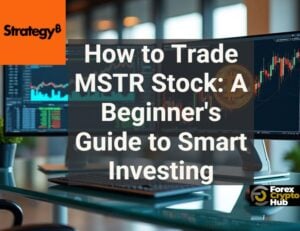Buying Bitcoin ETFs in Your TFSA: A Tax-Free Crypto Guide for Canadians
“Can you buy crypto in a TFSA?”
Many Canadian investors ask this question, and the answer might surprise you. Direct cryptocurrency purchases are not allowed in Tax-Free Savings Accounts. However, there’s a simple solution that investors often miss.
Table of Contents
Bitcoin ETFs provide a legitimate way to invest in crypto through your TFSA. Canada leads the world as the first country to approve these ETFs. This approval lets investors participate in the crypto market tax-efficiently without managing digital wallets or dealing with crypto exchanges.
This piece will help you learn how to buy Bitcoin ETFs in your TFSA. You’ll discover the best options and create an investment strategy that matches your goals, whether you’re starting with cryptocurrency or expanding your current portfolio.
Understanding Bitcoin ETFs for Canadian Investors
Bitcoin ETFs have revolutionized cryptocurrency investment in Canada. The country led North America by launching its first Bitcoin ETF5 in February 2021. This groundbreaking move changed the way people invest in digital currencies.
What is a Bitcoin ETF?
A Bitcoin ETF tracks Bitcoin’s price and trades on regular stock exchanges. The spot Bitcoin ETF holds real Bitcoin in cold storage27. Investors can now access cryptocurrency through their standard investment accounts. The fund provider buys actual Bitcoin each time someone invests in ETF shares27.
How Bitcoin ETFs differ from direct crypto investing
The main difference between Bitcoin ETFs and direct crypto investing shows up in several areas:
- Custody and Security: ETF providers use institutional-grade custodians28 to manage Bitcoin storage. This removes the hassle of dealing with digital wallets or private keys.
- Trading Environment: Bitcoin ETFs trade only during stock market hours29, unlike direct crypto trading that runs 24/7.
These ETFs come with professional management and regulatory oversight that you won’t find in direct crypto investments. The core team handles all technical details, which lets investors focus on their strategy instead of crypto mechanics.
Available Bitcoin ETF options in Canada
Canada’s Bitcoin ETF market now offers several 2-year old options with unique features and fees:
| ETF Name | Assets Under Management | Management Fee |
|---|---|---|
| Purpose Bitcoin ETF | CCAD 4.74 billion30 | 1.00%30 |
| CI Galaxy Bitcoin ETF | CCAD 1.66 billion30 | 0.40%30 |
| Fidelity Advantage Bitcoin ETF | CCAD 1.226 billion30 | 0.39%30 |
These funds have grown steadily. Canadian cryptocurrency ETFs increased their assets from CCAD 7.27 billion to CCAD 7.91 billion between September and October 202415.
Most Canadian Bitcoin ETFs also offer different fund versions:
- Currency-hedged options
- Unhedged versions
- USD-denominated units
Investors can pick the best option based on their goals and risk comfort level. The Purpose Bitcoin ETF stands out as the world’s first physically settled Bitcoin ETF27. It offers both currency-hedged and unhedged versions to match different investor priorities.
Benefits of Holding Bitcoin ETFs in a TFSA
Bitcoin ETFs in a TFSA create amazing financial advantages for Canadian investors. Let’s look at how this combination makes a powerful investment strategy.
Tax advantages explained
You should know that Bitcoin ETFs in a TFSA give you complete tax exemption on all capital gains2. This means you won’t owe any taxes on profits when you sell ETF holdings within your TFSA. You can withdraw the full amount tax-free2.
The tax benefit becomes a big deal as it means that investors with Bitcoin ETFs in a TFSA earn about 11% more than those who keep similar investments in non-registered accounts6.
TFSA contribution room considerations
Understanding TFSA contribution limits is vital when you invest in Bitcoin ETFs. The TFSA program started in 2009. It lets eligible Canadians (18 years or older with a valid SIN) contribute within their available room7. Your contribution room includes:
- Annual TFSA dollar limit
- Unused contribution room from previous years
- Withdrawals made in the previous year7
It’s worth mentioning that exceeding your available contribution room leads to a 1% monthly tax on the highest excess amount for each month the excess stays in your account7.
Comparing TFSA vs non-registered accounts
TFSAs are a great way to get several advantages over non-registered accounts for Bitcoin ETF investments:
| Feature | TFSA | Non-Registered Account |
|---|---|---|
| Capital Gains | Tax-free8 | Taxable |
| Withdrawals | No tax impact2 | Triggers taxable event |
| Investment Income | Tax-exempt7 | Taxable |
| Account Management | United holdings9 | Separate tracking required |
TFSAs make an ideal starting point for short-term investment goals or modest investment income10. You should know that losses in non-registered accounts can be claimed for tax purposes. However, losses within a TFSA will permanently affect your contribution room8.
Knowing how to hold Bitcoin ETFs in a TFSA gives Canadian investors a unique edge, since direct cryptocurrency cannot be held in these accounts11. This setup lets you get regulated exposure to cryptocurrency markets while keeping the tax advantages of a registered account6.
Step-by-Step Guide to Buying Bitcoin ETFs
Canadian brokerage platforms make Bitcoin ETF investing simple and straightforward. Here’s how you can start your investment trip.
Setting up a TFSA trading account
You need a self-directed TFSA trading account first. Canadian brokerages commonly provide this service2. Gather these items before you open your account:
- Government-issued photo ID
- Social Insurance Number (SIN)
- Proof of address
- Banking information
Choosing a brokerage platform
The next step involves picking the right brokerage platform. This comparison shows major Canadian platforms that let you trade Bitcoin ETFs:
| Platform Features | Traditional Brokers | Online Platforms |
|---|---|---|
| Trading Hours | 9:30 AM – 4:00 PM ET11 | 9:30 AM – 4:00 PM ET |
| Account Types | TFSA, RRSP, Non-registered | TFSA, RRSP, Non-registered |
| Professional Management | Yes12 | Yes |
| Security Features | Institutional-grade | Standard |
These trusted brokers support Bitcoin ETF trading:
Executing your first Bitcoin ETF purchase
Once your account is set up and funded, follow these steps to buy your first Bitcoin ETF:
- Research available ETF options
- Compare management fees (typically ranging from 0.75% to 1.50%)13
- Check trading volumes for liquidity assessment
- Place your order during market hours
- Monitor your investment
Key points to remember before trading:
- Market volatility can lead to big price swings12
- ETF prices might not match actual Bitcoin prices at times6
- Use stop-loss orders to protect your investment12
- Management expenses can affect your long-term returns
It’s worth mentioning that Bitcoin trades around the clock, but ETFs only trade during regular market hours13. This means major cryptocurrency price changes after hours will show up in ETF prices when markets open again.
Comparing Canadian Bitcoin ETF Options
Canadian Bitcoin ETFs now compete more with their US counterparts. This makes it vital to understand what sets these options apart. Let’s look at the factors that will affect our investment choices.
Management fees and expenses
The management expense ratios (MER) of Canadian Bitcoin ETFs have changed by a lot. The Fidelity Advantage Bitcoin ETF now has the lowest management fee at 0.39%14, which differs from its earlier 0.95% rate14. Here’s how the major Canadian Bitcoin ETFs stack up:
| ETF Name | Management Fee | MER |
|---|---|---|
| Fidelity Advantage Bitcoin ETF | 0.39% | 0.44% |
| CI Galaxy Bitcoin ETF | 0.40% | 0.80% |
| Purpose Bitcoin ETF | 1.00% | 1.49% |
| 3iQ Bitcoin ETF | 1.00% | 1.75% |
Trading volume and liquidity analysis
Trading volumes for Canadian cryptocurrency ETFs have shown notable changes. These funds experienced:
- An increase in assets from CCAD 7.27 billion to CCAD 7.91 billion between September and October 202415
- A sharp decline in trading activity since July 202216
The Purpose Bitcoin ETF leads in liquidity with CCAD 3.53 billion in assets under management17. This makes it Canada’s most actively traded Bitcoin ETF.
Currency hedging considerations
Canadian Bitcoin ETFs stand out because of their currency hedging options. Here’s what to think over:
Unhedged ETFs:
Hedged ETFs:
Your view of currency markets and risk tolerance determines the choice between hedged and unhedged options. The Purpose Bitcoin ETF offers both versions, so you can choose based on your currency exposure priorities15.
Building a TFSA Bitcoin ETF Strategy
A balanced strategy for Bitcoin ETFs in our TFSA demands smart choices about allocation, timing, and maintenance. We need to create an approach that lines up with our investment goals.
Portfolio allocation guidelines
BlackRock, the world’s largest asset manager, suggests a conservative 2% allocation to Bitcoin ETFs in a traditional portfolio19. This allocation delivers risk exposure similar to major tech stocks while offering ways to diversify.
Your risk tolerance determines these allocation ranges:
| Investment Style | Bitcoin ETF Allocation | Risk Level |
|---|---|---|
| Conservative | 1-2% | Low |
| Moderate | 2-4% | Medium |
| Aggressive | 4-6% | High |
The optimal mix suggests 71.4% Bitcoin and 28.6% Ethereum exposure20 for crypto-focused portfolios. These allocations should match your overall investment strategy and risk comfort level.
Dollar-cost averaging approach
A dollar-cost averaging (DCA) strategy helps manage Bitcoin ETFs’ natural volatility when combined with proper allocation. You might invest CAD 174.17 weekly over a year instead of investing CAD 8360.16 at once21.
DCA offers these advantages for Bitcoin ETF investments:
- Reduced impact of short-term price fluctuations
- Lower average cost per unit over time
- Minimized emotional decision-making
- Consistent investment discipline
Your TFSA needs a regular investment schedule that continues whatever the market conditions1.
Rebalancing best practices
Regular rebalancing becomes vital as market movements shift portfolio weights. Annual rebalancing works best for most investors, though some prefer quarterly adjustments22.
Your Bitcoin ETF holdings need these rebalancing considerations:
- Set specific deviation triggers (typically 5% from target allocation)
- Think about tax implications within non-registered accounts
- Document each rebalancing action
- Review allocation targets annually
The best results come from rebalancing through:
- Adding new funds to underweight positions
- Selling overweight positions to purchase underweight assets
- Combining both approaches based on cash flow
A disciplined approach helps manage risk and potentially boosts long-term returns. Success comes from consistency with your chosen strategy and avoiding emotional reactions to market swings23.
Risk Management for Bitcoin ETF Investors
Managing risk is vital when investing in Bitcoin ETFs through TFSAs. We need to protect our investments and maximize potential returns as experienced investors.
Understanding volatility effects
Bitcoin prices can swing dramatically. Daily movements of 5% or more happen regularly13. These fluctuations affect our Bitcoin ETF investments much like direct crypto holdings, with some notable differences.
Our TFSA investments show these volatility effects:
| Market Condition | Impact on Bitcoin ETFs | Risk Level |
|---|---|---|
| Normal Trading | Tracks Bitcoin price | Moderate |
| High Volatility | Potential tracking errors | High |
| Market Stress | Increased correlation with traditional assets | Very High |
Bitcoin’s nature as a non-sovereign, decentralized asset makes it react differently to market events than traditional investments24. This quality can benefit us since Bitcoin often shows minimal correlation with stocks, bonds, and commodities13.
Setting stop-loss orders
Stop-loss orders might seem like an obvious risk management tool. These orders need careful planning for ETF investments. We learned that stop-loss orders don’t always shield us as expected.
Stop-loss implementation needs these considerations:
- Market hours affect execution timing17
- Price gaps between trading sessions can bypass stop levels
- Quick market dips might trigger unnecessary sales25
These advanced stop-loss strategies can give better results:
- Set wider stops in volatile periods3
- Adjust stops based on support levels
- Use stop-limit orders to control prices better
- Review and modify orders as markets change
Diversification strategies
Diversification shields us from Bitcoin’s volatility. BlackRock believes Bitcoin’s unique qualities make it an effective portfolio diversifier24. We can boost our TFSA protection through smart asset allocation.
Smart diversification includes:
Asset Class Mix:
- Traditional investments (stocks, bonds)
- Cryptocurrency exposure via ETFs
- Cash positions for opportunities
Cryptocurrency ETF Selection:
- Multiple providers to reduce company risk
- Different underlying assets (Bitcoin, Ethereum)
- Various currency hedge options
Risk Management Tools:
- Regular portfolio monitoring
- Systematic rebalancing
- Position size limits
A detailed approach helps manage risk well. The Ontario Securities Commission found that more than one in five Canadians feel unsure about buying crypto assets safely4. Bitcoin ETFs give us professional management and institutional-grade security while maintaining crypto market exposure5.
Our risk strategy should cover these unique aspects of Bitcoin ETFs:
Trading Limitations:
- Market hours restrictions17
- Potential tracking errors
- Currency exposure considerations
Portfolio Protection:
- Position sizing (typically 1-10% of total portfolio)26
- Regular rebalancing intervals
- Stop-loss placement strategies
Market Monitoring:
- Price correlation tracking
- Volatility assessment
- News impact analysis
Smart implementation of these strategies protects our TFSA investments while keeping Bitcoin’s growth potential. Success comes from balancing cryptocurrency exposure with sound risk management.
Conclusion
Bitcoin ETFs give Canadian investors a great chance to get tax-free cryptocurrency exposure in their TFSAs. These investment vehicles solve many common crypto investing problems and offer professional management with robust security features.
Smart investors look at management fees, currency hedging options, and trading volumes to pick the right Bitcoin ETF that matches their goals. On top of that, solid risk management through diversification and regular rebalancing helps shield TFSA investments from crypto’s wild price swings.
Your success with Bitcoin ETF investing comes down to three key factors. You need disciplined portfolio allocation, consistent rebalancing schedules, and unwavering focus on your long-term strategy. This knowledge empowers you to add Bitcoin ETFs to your TFSA while keeping risks in check and maximizing potential returns.
FAQs
Q1. Can I hold Bitcoin directly in my TFSA? No, you cannot hold Bitcoin directly in a TFSA. However, you can invest in Bitcoin ETFs, which are available for purchase through Canadian brokerage platforms and can be held in a TFSA.
Q2. What are the tax advantages of holding Bitcoin ETFs in a TFSA? When you hold Bitcoin ETFs in a TFSA, all capital gains and investment income are completely tax-exempt. This means you won’t owe any taxes on your profits, even when withdrawing the full amount.
Q3. How do I choose the right Bitcoin ETF for my TFSA? Consider factors such as management fees, trading volume, liquidity, and currency hedging options. Compare different ETFs like Purpose Bitcoin ETF, CI Galaxy Bitcoin ETF, and Fidelity Advantage Bitcoin ETF to find the one that best suits your investment goals.
Q4. What is the recommended allocation for Bitcoin ETFs in a portfolio? Conservative investors might allocate 1-2% of their portfolio to Bitcoin ETFs, while more aggressive investors could consider up to 4-6%. It’s important to align the allocation with your overall investment strategy and risk tolerance.
Q5. How can I manage the risks associated with Bitcoin ETF investments? Implement strategies such as diversification across different asset classes, setting appropriate stop-loss orders, and regularly rebalancing your portfolio. Additionally, consider using dollar-cost averaging to mitigate the impact of Bitcoin’s price volatility.
References
[1] – https://ndax.io/en/blog/article/dca-101-a-smart-way-to-navigate-crypto-markets
[2] – https://veritasblockchain.ca/guides/how-to-buy-bitcoin-etfs-in-tfsa-rrsp-accounts/
[3] – https://crypto.com/en/university/stop-loss-and-take-profit-levels-crypto
[4] – https://www.fidelity.ca/en/insights/articles/can-you-hold-digital-assets-in-your-tfsa/
[5] – https://www.td.com/ca/en/investing/direct-investing/articles/crypto-etf
[6] – https://www.moneysense.ca/save/investing/crypto/how-to-invest-tax-free-in-a-bitcoin-etf-in-canada/
[7] – https://www.canada.ca/en/revenue-agency/services/forms-publications/publications/rc4466/tax-free-savings-account-tfsa-guide-individuals.html
[8] – https://money.ca/investing/cryptocurrency/buy-bitcoin-in-tfsa-or-rrsp
[9] – https://www.td.com/ca/en/investing/direct-investing/investment-types/crypto-etfs
[10] – https://turbotax.intuit.ca/tips/what-investments-are-allowed-in-a-tfsa-and-how-to-invest-them-16012?srsltid=AfmBOopHkQlx-rfmnvoDgooqTP5_F8nLPuLUEAl3KiMf18OEgupY1VJt
[11] – https://www.investorsedge.cibc.com/en/learn/investing/etfs-and-mutual-funds/buying-cryptocurrency-etfs.html
[12] – https://www.moomoo.com/ca/learn/detail-best-crypto-etf-canada-117662-241156110
[13] – https://etfmarket.cboe.ca/en/news/3-ways-invest-cryptocurrency-tax-free-using-etfs
[14] – https://www.investmentexecutive.com/news/industry-news/canadian-bitcoin-etfs-face-price-pressure-after-u-s-approvals/
[15] – https://www.morningstar.ca/ca/news/257695/can-i-buy-a-bitcoin-spot-etf-in-canada.aspx
[16] – https://www.tdsecurities.com/ca/en/bitcoin-etf-first-two-years
[17] – https://www.moomoo.com/ca/learn/detail-best-bitcoin-etf-canada-117809-250111005
[18] – https://harvestportfolios.com/currency-hedged-etfs-vs-unhedged-etfs-which-is-right-for-you/
[19] – https://bravenewcoin.com/insights/blackrock-recommends-bitcoin-allocation-heres-how-much-should-be-in-your-portfolio
[20] – https://www.vaneck.com/ca/en/news-and-insights/blogs/digital-assets/matthew-sigel-optimal-crypto-allocation-for-portfolios/
[21] – https://bitbuy.ca/en-ca/guides/dollar-cost-averaging-the-best-way-to-invest-in-crypto
[22] – https://www.investopedia.com/how-to-rebalance-your-portfolio-7973806
[23] – https://www.bitdegree.org/crypto/tutorials/crypto-etf
[24] – https://www.blackrock.com/us/financial-professionals/insights/bitcoin-unique-diversifier
[25] – https://www.investopedia.com/articles/active-trading/121815/are-stoploss-orders-and-etfs-good-idea.asp
[26] – https://vyzer.co/blog/how-can-crypto-etfs-diversify-your-portfolio
[27] – https://www.purposeinvest.com/funds/purpose-bitcoin-etf
[28] – https://www.purposeinvest.com/funds/crypto/knowledge-base/how-does-a-bitcoin-etf-work
[29] – https://www.bnnbloomberg.ca/investing/2024/01/12/what-canadian-investors-need-to-know-about-bitcoin-etfs/
[30] – https://www.nasdaq.com/articles/13-canadian-crypto-etfs-updated-2024




